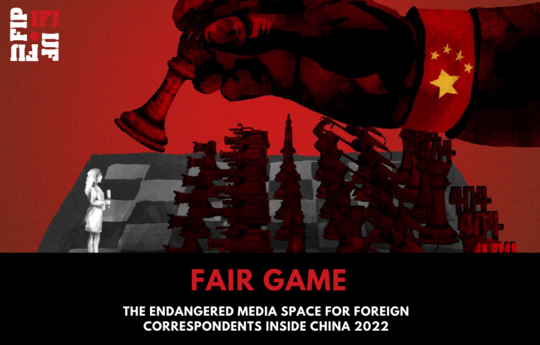The report reveals barriers to speaking directly to ordinary Chinese citizens and an increasing reliance on sources living outside China, whose views may be more negative, make it harder for the foreign media to tell China’s story in the most comprehensive and nuanced way.
In China, resident foreign correspondents face barriers including expulsions, delays and denials in the granting of visas, intimidation of sources, digital and physical surveillance, and lawsuits alleging breaches of reporting protocols such as identifying oneself as a journalist, which carry the risk of being denied an exit visa until the case is resolved.
One local source said that if anything they had said was reported in the international media, they would be jailed. Two Australian journalists fled the country in fear of being detained after their own government warned they were being targeted by the security forces regarding suspected links with a female Chinese-Australian reporter who had been detained for allegedly leaking state secrets.
State-run media, “Wolf Warrior” diplomats abroad and government-affiliated groups on social media incite physical harassment of foreign journalists and their local staff, which can extend to death threats. The most vulnerable are young women of Chinese heritage, who are accused of being “race traitors”. After the state-owned Global Times newspaper attacked an article by a Chinese-American reporter, she was trolled with sexually explicit threats, including one post saying: “If you see this reporter, beat her to death.”
Fair Game is based on in-depth interviews conducted in December 2021 with 19 current or recent correspondents from nine countries, who work across print and broadcast and whose experience in China ranges from a couple of years to several decades. It also draws on Locked Down or Kicked Out: Covering China, the Foreign Correspondents Club of China 2021 Media Freedoms Report, which features the FCCC’s most recent annual survey of its roughly 190 members.
Fair Game is the fourth report by the International Federation of Journalists on China’s efforts to extend its influence in the international media. These reports follow the IFJ’s China Press Freedom Program (2008-2019), which documented the evolving media space in China and its impact on journalism, media infrastructure and freedom of expression. A separate report by IFJ affiliate the Hong Kong Journalists Association in 2021, titled Freedom in Tatters, focuses on those changes.
In Beijing in 2022, reporters are confined within a “closed loop management system”, blocked from any contact with the “real China” from the time they land to the time they leave. Notwithstanding understandable concerns about the COVID pandemic, the restrictions highlight the precipitous decline in media freedom over more than a decade.
The IFJ makes a series of recommendations to China’s authorities, media, journalist unions and governments including:
- Authorities should respect the rights and role of correspondents and a free press in reporting important stories inside China to a global audience, including the right to different narratives and forms of reporting.
- A shrinking international press corps makes it harder to tell China’s story comprehensively, authoritatively and with nuance and understanding. A reform of the approach to foreign media is necessary, fair, and reasonable in light of the expanding media space now being taken up by Chinese media globally in virtually every continent as foreign governments allow Chinese journalists to do.
- Attacks on foreign journalists led by China’s state media or affiliates on social media should be condemned as a practice that imperils journalist physical safety and reflects negatively on China and its operations globally.
- Foreign embassies based inside China should continue to advocate and speak for greater access and an end to harassment of their nation’s correspondents.
- Journalist unions and other press freedom and journalism advocacy groups should develop resources for journalists reporting in China, to help them understand the dangers and challenges, including reporting on sensitive issues, minimizing their electronic footprint and best practices to protect sources, local researchers, and news assistants.
- Correspondents reporting inside China should be trained on safe story planning, authority tactics to block reporting and the processes to report back and check-in to their employers and loved ones.
- Foreign journalists of Chinese or Asian heritage present a new frontline for reporting but one that also comes with inherent risks. Any targeting of Chinese heritage journalists as “race traitors” or otherwise should be strongly condemned.
- The International Federation of Journalists (IFJ) and others should continue attempts to engage with the All-China Journalists Association (ACJA) to strengthen mutual understanding and to address concerns over visas, the safety of journalists and other matters.
The report follows the IFJ’s previous research released in May 2021: The Covid-19 Story: Unmasking China’s Global Strategywhich began exploring how China was establishing its media presence globally in virtually every continent globally.
The IFJ has maintained a dedicated program on China press freedom since the 2008 Beijing Olympics. Since 2019, it has expanded its strategy to explore China’s increasing global influence.

